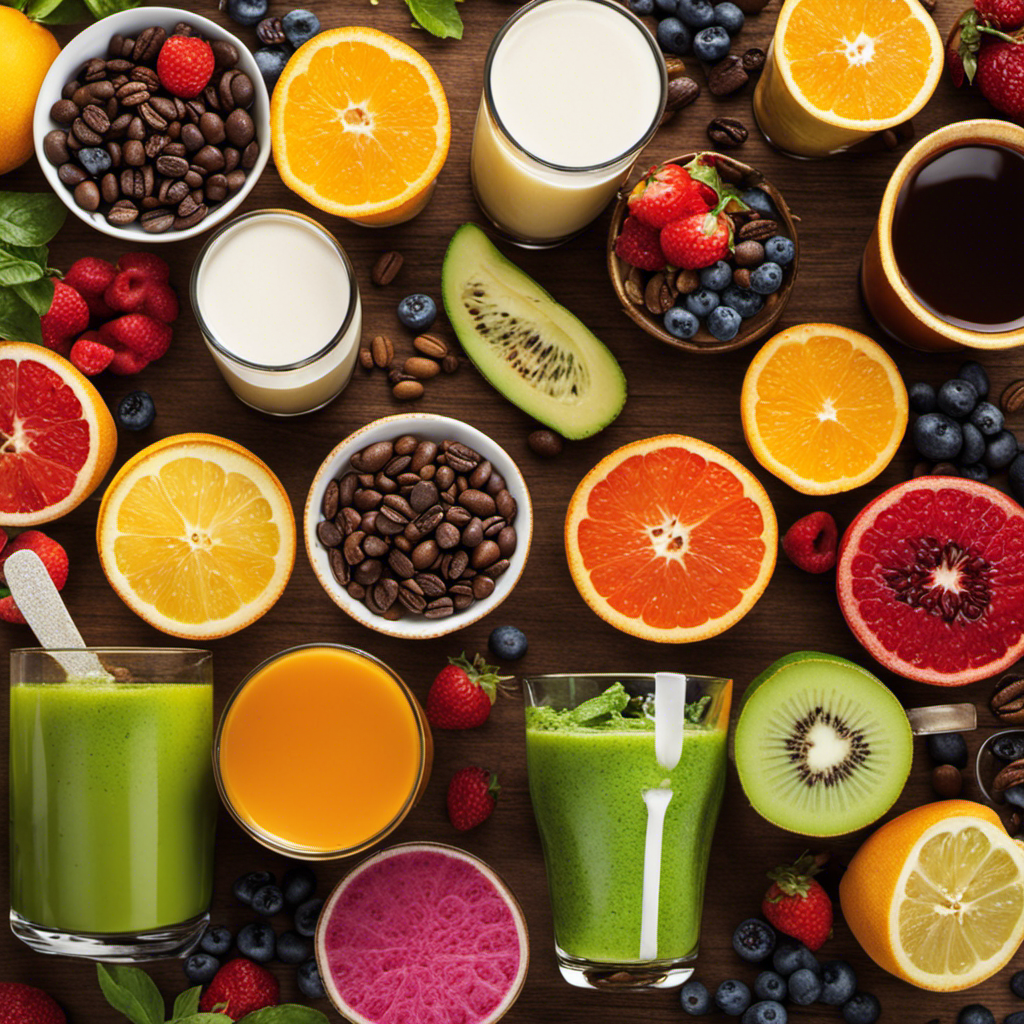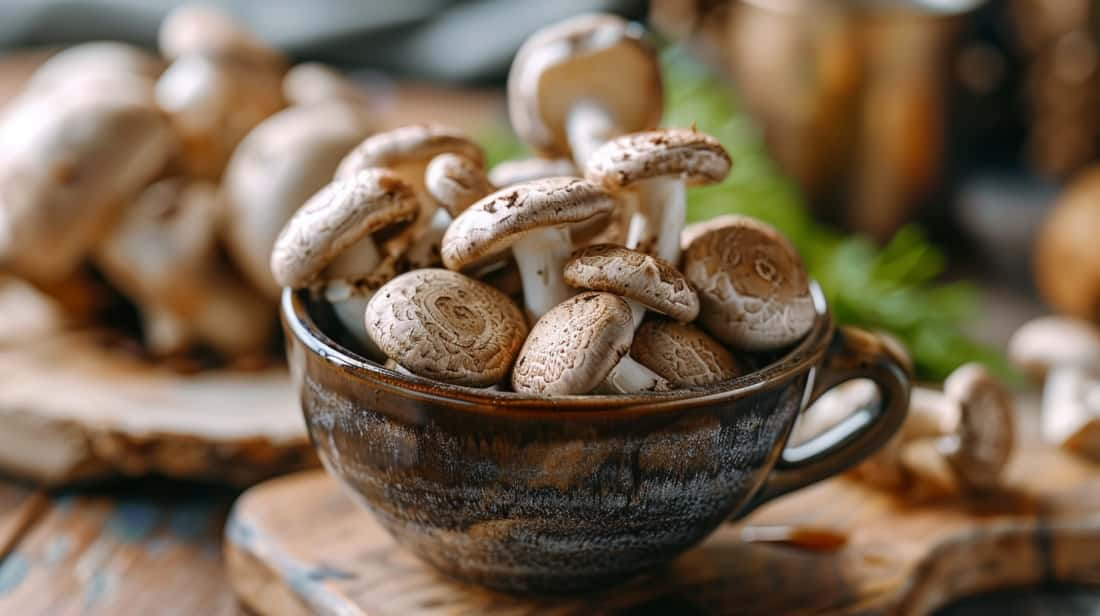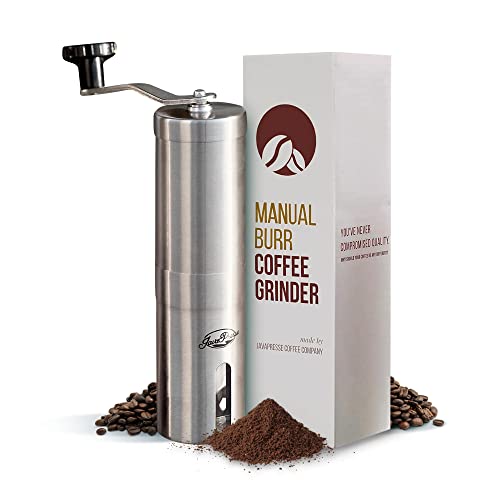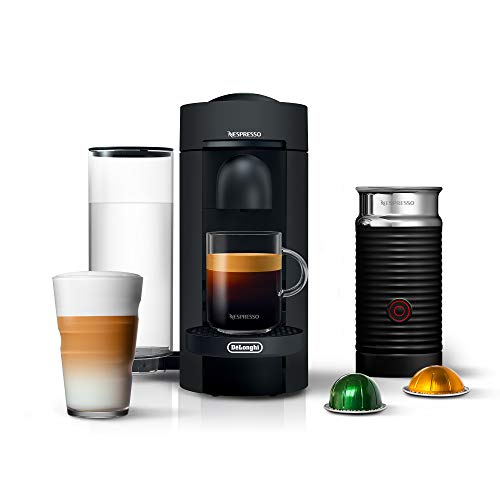Coffee Alternatives And Tea
Escape the Buzz: Refreshing Alternatives to Caffeinated Beverages

Hey there! Interested in finding a break from the buzz of caffeinated beverages? You’re in the right place! In this article, I will share some rejuvenating alternatives to assist in reducing your caffeine consumption.
We’ll delve into the world of decaf coffee, exploring its unique characteristics and preparation methods.
We’ll also explore different herbal infusions and their amazing health benefits.
And don’t worry, I won’t forget about nourishing options like fruit juice, water, milk, and smoothies, each with their own nutritional values.
So, let’s embark on a journey towards a revitalizing, caffeine-free lifestyle together!
Key Takeaways
- Consuming less caffeine has numerous benefits for overall health and well-being.
- Reducing caffeine intake can improve sleep quality.
- Decaf coffee provides a great alternative for those seeking to reduce caffeine intake.
- Herbal infusions and caffeine-free drinks offer various health benefits and hydration options.
The Importance of Reducing Caffeine Consumption
I sometimes find it challenging to reduce my caffeine consumption, but acknowledging the importance of doing so motivates me to explore alternative options. Consuming less caffeine has numerous benefits for our overall health and well-being.
It can help improve sleep quality, reduce anxiety and jitters, and promote better hydration. To successfully reduce caffeine intake, it’s important to start gradually. Begin by replacing one cup of coffee with a decaf option or herbal infusion.
Another helpful tip is to limit caffeine intake after a certain time in the afternoon to ensure a restful sleep. By incorporating these strategies, we can enjoy the benefits of consuming less caffeine while still satisfying our taste for warm beverages.
Let’s dive into the world of decaf coffee and discover its unique characteristics and preparation methods.
Decaf Coffee: Preparation and Unique Characteristics
Decaf coffee, with its distinct flavor and aroma, can be prepared using a variety of methods, such as water processing or carbon dioxide extraction. It’s fascinating how these methods can preserve the rich taste of regular coffee while removing most of the caffeine.
If you’re curious about decaf coffee, here are three things you should know:
-
Flavor Profiles: Decaf coffee retains many of the flavor profiles found in regular coffee, such as the nutty, chocolatey, or fruity notes. However, some people claim that decaf coffee has a slightly milder taste compared to its caffeinated counterpart.
-
Brewing Methods: Decaf coffee can be brewed using the same methods as regular coffee, including pour-over, French press, or espresso machines. The brewing time and water temperature might need slight adjustments to accommodate the lower caffeine content.
-
Health Benefits: Decaf coffee provides a great alternative for those seeking to reduce caffeine intake without sacrificing the joy of a hot cup of coffee. It still contains antioxidants and may offer potential benefits like improved liver function and reduced risk of certain diseases.
Exploring Herbal Infusions and Their Health Benefits
One of the herbal infusions I enjoy is chamomile tea. It is known for its calming properties and can help improve sleep quality.
Exploring different herbal infusions and their health benefits is a fascinating journey that can enhance our well-being.
Herbal infusions are caffeine-free alternatives to traditional beverages and offer a range of health benefits. For example, peppermint tea can aid digestion, while ginger tea can soothe an upset stomach. Green tea is rich in antioxidants and may promote heart health.
Understanding the impact of caffeine on the body and mind is important, as excessive consumption can lead to sleep disturbances and increased anxiety.
Nourishing Alternatives: Fruit Juice, Water, Milk, and Smoothies
When it comes to nourishing alternatives to caffeinated beverages, there are a few options that stand out.
Fruit juice is packed with vitamins and minerals, providing a refreshing and healthy choice.
Milk is another great option, offering a good source of protein and calcium.
And let’s not forget about smoothies, which can be made with a variety of fruits and vegetables, giving you a delicious and nutritious way to stay hydrated.
Health Benefits of Fruit Juice
Although I enjoy a variety of beverages, I appreciate the health benefits of fruit juice. It isn’t only delicious but also packed with essential vitamins and minerals that promote overall well-being. Here are three key benefits of consuming fruit juice:
-
Hydration: Fruit juice is an excellent way to stay hydrated, especially during hot summer months. It helps replenish lost fluids and keeps your body functioning at its best.
-
Antioxidants: Many fruits contain antioxidants that help protect your body against harmful free radicals. By consuming fruit juice, you can boost your immune system and reduce the risk of chronic diseases.
-
Nutrient-rich: Fruit juice is a concentrated source of vitamins and minerals, such as vitamin C, potassium, and folate. These nutrients support healthy skin, digestion, and cardiovascular health.
With its numerous health benefits, incorporating fruit juice into your daily routine can be a simple and enjoyable way to take care of your body.
Now let’s explore the nutritional value of milk.
Nutritional Value of Milk
I always start my day with a glass of milk because it provides essential nutrients and, at the same time, keeps me feeling refreshed and energized. Milk is not only delicious, but it also contains vital vitamins and minerals that support overall health. However, I understand that some individuals may have lactose intolerance or prefer milk alternatives for various reasons.
For those who are lactose intolerant, there are several milk alternatives available on the market. These alternatives are often plant-based and derived from ingredients like soy, almonds, oats, or coconut. They provide a similar creamy texture and can be used in various recipes or enjoyed on their own.
To help you better understand the nutritional content of different milk options, I have created a table comparing the nutrient profiles of whole milk, almond milk, and oat milk:
| Nutrient | Whole Milk | Almond Milk | Oat Milk |
|---|---|---|---|
| Protein | 8g | 1g | 3g |
| Calcium | 276mg | 451mg | 350mg |
| Vitamin D | 127 IU | 0 IU | 120 IU |
As you can see, each milk alternative has its own unique nutritional composition, and it’s essential to choose the one that best suits your dietary needs.
Whether you prefer traditional dairy milk or opt for one of the many milk alternatives, it’s crucial to ensure you’re getting the necessary nutrients your body requires. So, go ahead and explore the options available to you, taking into consideration any dietary restrictions or preferences you may have. Remember, the goal is to find what works best for you and enjoy a healthy and fulfilling lifestyle.
Refreshing Smoothie Recipes
Since smoothies are a delicious and nutritious alternative to caffeinated beverages, I often enjoy starting my day with a refreshing smoothie recipe.
Here are three benefits of incorporating smoothies into your daily routine:
-
Boost of nutrients: Smoothies are a fantastic way to pack in essential vitamins, minerals, and antioxidants. By blending together fruits, vegetables, and other wholesome ingredients, you can create a nutrient-dense beverage that fuels your body and supports overall well-being.
-
Hydration made easy: Staying hydrated is crucial for optimal health, and smoothies can help you achieve that. By adding water or a liquid base like coconut water or almond milk to your smoothie, you’re not only enhancing the flavor but also increasing your daily fluid intake.
-
Convenient and customizable: Smoothies are incredibly versatile, allowing you to customize them to suit your taste preferences and dietary needs. You can experiment with different flavor combinations, add protein powder or superfoods, and even sneak in some leafy greens for an extra nutritional boost.
Incorporating refreshing smoothie recipes into your daily routine can provide a multitude of benefits. It’s a convenient and delicious way to nourish your body while reducing your reliance on caffeinated beverages.
Unveiling the Nutritional Values of Non-Caffeinated Beverages
Looking for healthier alternatives to caffeinated beverages?
Let’s unveil the nutritional values of non-caffeinated drinks.
From decaf coffee with its rich flavor and reduced caffeine content, to herbal infusions packed with antioxidants and various health benefits, to fruit juice brimming with vitamins and minerals – there are plenty of options to satisfy your taste buds and nourish your body.
Health Benefits of Decaf
Drinking decaf coffee can contribute to a healthier lifestyle by reducing the intake of caffeine and promoting better sleep. As someone who desires to serve others and promote their well-being, I want to highlight the benefits of choosing decaf coffee as an alternative. Here are three reasons why decaf coffee can be a great choice:
-
Lower caffeine intake: Decaf coffee contains only a small amount of caffeine compared to regular coffee. This can be beneficial for those who are sensitive to caffeine or want to limit their intake.
-
Improved sleep quality: By choosing decaf coffee, you can enjoy a cup of coffee without worrying about the negative effects on your sleep. Caffeine can disrupt sleep patterns, so opting for decaf can help promote better sleep.
-
Retaining coffee flavor: Decaf coffee is made by removing most of the caffeine from regular coffee beans while keeping the delicious flavor intact. This means you can still enjoy the taste and aroma of coffee without the stimulating effects of caffeine.
Nutritional Value of Herbal Infusions
I must admit, the nutritional value of herbal infusions is quite impressive and they can be a great addition to a healthy diet. Herbal infusions aren’t only delicious and refreshing, but they also offer numerous health benefits. These natural concoctions are made by steeping herbs, flowers, or fruits in hot water, extracting their beneficial properties.
One of the key health benefits of herbal infusions is their high nutritional value. They’re packed with vitamins, minerals, and antioxidants that can support overall well-being and boost the immune system. For example, chamomile tea is known for its calming properties and can help with sleep and relaxation. Peppermint tea aids digestion and can alleviate symptoms of bloating and indigestion. Additionally, green tea is rich in antioxidants that have been linked to reducing the risk of chronic diseases like heart disease and certain types of cancer.
Incorporating herbal infusions into your daily routine is a simple and effective way to enhance your health. Whether you enjoy a cup of soothing chamomile before bedtime or a refreshing peppermint infusion after a meal, these natural beverages offer a plethora of health benefits and can contribute to a balanced and nutritious diet.
Benefits of Fruit Juice
As a health enthusiast, I can’t help but appreciate the variety of vitamins and minerals found in fruit juice, making it a beneficial addition to a well-balanced diet. Here are three reasons why fruit juice is a great choice for your health:
-
Rich in Nutrients: Fruit juices are packed with essential nutrients like vitamin C, potassium, and antioxidants. These nutrients contribute to a strong immune system, healthy skin, and overall well-being.
-
Hydration: Staying hydrated is crucial for optimal health, and fruit juice can help you achieve that. It provides a refreshing and flavorful way to quench your thirst while replenishing your body with fluids.
-
Variety of Options: Whether you prefer apple, orange, grapefruit, or a blend of different fruits, there’s a fruit juice for everyone. You can choose from fresh-squeezed or store-bought options, ensuring there’s always something that suits your taste and nutritional needs.
Incorporating fruit juice into your diet can provide numerous health benefits and enhance your overall nutritional value. So go ahead and pour yourself a glass of delicious fruit juice to enjoy its goodness while taking care of your health.
Embrace a Caffeine-Free Lifestyle: Refreshed and Revitalized
Finally, I can feel refreshed and revitalized after embracing a caffeine-free lifestyle. The benefits of living without caffeine are truly remarkable. Not only do I no longer experience the jitters and crashes associated with caffeine, but I also sleep better and have more steady energy throughout the day.
But what about the drinks? Discovering caffeine-free alternatives has been a game-changer. Decaf coffee, for example, allows me to enjoy the taste and aroma of coffee without the stimulating effects. Herbal infusions, such as chamomile and peppermint, provide a soothing and calming experience.
And let’s not forget about fruit juice, water, milk, and smoothies. These options not only quench my thirst but also provide essential nutrients.
Frequently Asked Questions
How Does Caffeine Affect the Body and Why Is It Important to Reduce Its Consumption?
Reducing caffeine consumption is important for its effects on the body. Transitioning to a caffeine-free lifestyle brings benefits like improved sleep and reduced anxiety. Here are tips for making the switch.
What Are Some Alternatives to Caffeinated Beverages That Can Provide a Similar Energy Boost?
There are natural supplements that can provide an energy boost without caffeine. Exercise is also a great way to get an energy boost. It’s important to find alternatives that work for you and support a caffeine-free lifestyle.
Is Decaf Coffee Completely Caffeine-Free and How Is It Prepared?
Decaf coffee is not completely caffeine-free, but it contains significantly less caffeine than regular coffee. It is prepared by removing most of the caffeine through a process called decaffeination.
What Are Some Popular Herbal Infusions and What Health Benefits Do They Offer?
Some popular herbal infusions include chamomile, peppermint, and ginger. These infusions offer various health benefits such as relaxation, digestion aid, and immune support. Incorporating them into your routine can promote a caffeine-free lifestyle.
What Are the Nutritional Values of Fruit Juice, Water, Milk, and Smoothies, and How Can They Contribute to a Balanced Diet?
Fruit juice, water, milk, and smoothies all have different nutritional benefits. Fruit juice provides vitamins and antioxidants, water hydrates, milk offers calcium and protein, and smoothies can help meet nutritional needs. Incorporating these into a balanced diet is essential.
Conclusion
In conclusion, by choosing to reduce caffeine consumption, you open the door to a world of refreshing alternatives that can invigorate your mind and body without the jittery side effects. Just like a cool breeze on a hot summer day, these caffeine-free beverages offer a satisfying and revitalizing experience.
So why not embark on a caffeine-free lifestyle? Embrace the tranquility of herbal infusions, the nourishment of fruit juice, water, milk, and smoothies, and discover a new level of refreshment that will leave you feeling rejuvenated and ready to take on the day.
Noah, the Editor-in-Chief at Cappuccino Oracle, plays a pivotal role in shaping the voice and vision of our renowned platform. With an unwavering passion for coffee, coffee alternatives, and tea, Noah leads Cappuccino Oracle towards new horizons in the realm of coffee journalism.
Beyond his professional responsibilities, Noah serves as a mentor and guiding force for his team. His dedication to journalistic excellence and genuine love for coffee, coffee alternatives, and tea continue to inspire and motivate the Cappuccino Oracle family. In the ever-evolving world of these beverages, Noah’s leadership ensures that our platform remains at the forefront, delivering enlightening and enjoyable content to our readers worldwide.
Mushroom Coffee
Discover the Magic of Mushroom Coffee: Ryze Organic Unveiled

Welcome to the fascinating world of mushroom coffee, where ancient wisdom meets modern wellness. In this comprehensive guide, we’ll explore the revolutionary Ryze Organic mushroom coffee, a blend that’s taking the functional beverage market by storm. Whether you’re a coffee aficionado or a health enthusiast, prepare to be amazed by the unique benefits and flavors of this innovative brew.
What is Mushroom Coffee?
Mushroom coffee is a cutting-edge beverage that combines the rich, robust flavors of coffee with the powerful health benefits of medicinal mushrooms. This unique fusion creates a drink that not only energizes but also supports overall well-being. Learn more about the health benefits of functional beverages.
The Science Behind Mushroom Coffee
The magic of mushroom coffee lies in its synergistic blend of coffee and medicinal mushrooms. These fungi have been used for centuries in traditional medicine and are now making a comeback in the wellness world. Ryze Organic harnesses the power of mushrooms like Lion’s Mane, Cordyceps, and Reishi, each offering unique health benefits.
Key Benefits of Medicinal Mushrooms in Ryze Organic
- Cognitive Function Support: Lion’s Mane mushroom stimulates nerve cell growth and improves cognitive function in patients with mild cognitive impairment.
- Immune System Boost: Reishi mushroom enhances the body’s natural defense against infection and disease, increasing the production of white blood cells.
- Stress Reduction: Cordyceps mushroom reduces symptoms of anxiety and depression in patients with chronic stress.
- Improved Energy and Focus: Cordyceps supplementation improves exercise performance and reduces fatigue, while Lion’s Mane increases the production of neurotransmitters involved in regulating energy and focus.
Curious about the science behind these incredible benefits? Dive deeper into Coffee Lovers 101 coffee guides to learn more.
Ryze Organic: A Closer Look
Ryze Organic is at the forefront of the mushroom coffee revolution. This innovative company is committed to delivering high-quality, organic products that support both health and sustainable practices.


Ryze Organic coffee is designed with your health in mind. Each serving contains only 1g of total carbohydrates and 0g of protein, making it an excellent choice for those following intermittent fasting or low-carb diets. With 48mg of caffeine per cup, it provides a gentle energy boost without the jitters often associated with traditional coffee.
Want to know more about Ryze Organic’s product range and features? Check out Coffee Lovers 101 detailed Ryze Coffee guide.
Brewing and Enjoying Mushroom Coffee
Brewing Ryze Organic mushroom coffee is a breeze, and the result is a smooth, flavorful cup that might just become your new favorite morning ritual. Here are some tips to get you started:
Recommended Brewing Methods for Ryze Organic
For more brewing techniques and tips, be sure to explore Coffee Lovers 101 comprehensive brewing guides.
Health and Wellness Aspects of Ryze Organic
Ryze Organic mushroom coffee is more than just a tasty beverage – it’s a powerhouse of health benefits. Here’s what you can expect:
- Enhanced cognitive function and focus
- Sustained energy without crashes
- Improved immune system support
- Reduced acidity compared to regular coffee
- Gentle on the stomach
Interested in learning more about how coffee can support your health journey? Dive into Coffee Lovers 101 health and wellness section for in-depth articles and tips.
Is Mushroom Coffee Right for You?
If you’re looking to elevate your coffee experience while supporting your health goals, Ryze Organic mushroom coffee might be the perfect choice. It offers a unique blend of flavor and function that can seamlessly integrate into your daily routine.


Ready to embark on your mushroom coffee journey? Why not start by trying some creative recipes? Coffee Lovers 101 coffee recipes section is full of inspiring ideas to help you make the most of your Ryze Organic blend.
Conclusion: Embrace the Mushroom Coffee Revolution
Ryze Organic mushroom coffee represents a new frontier in the world of functional beverages. By combining the beloved ritual of coffee drinking with the powerful benefits of medicinal mushrooms, it offers a unique way to support your health and wellness goals without sacrificing flavor or enjoyment.
Whether you’re looking to boost your productivity, support your immune system, or simply enjoy a delicious cup of coffee with added benefits, Ryze Organic has something to offer. So why not give it a try? Your taste buds – and your body – might just thank you.
Remember, the journey to better health and wellness is ongoing. Keep exploring, keep learning, and most importantly, keep enjoying every sip of your coffee adventure!
In the vast and diverse world of coffee, coffee alternatives, and tea, Olivia has found her calling. As an author and a dedicated coffee and tea aficionado, her work for Cappuccino Oracle reflects her profound love and understanding of the intricate complexities found within these beverages. Olivia’s passion for the subject serves as both a catalyst for her creativity and a connection point with her audience.
Olivia’s appreciation for coffee, coffee alternatives, and tea blossomed at an early age. She discovered that these beverages invigorated her senses and stimulated her creative spirit. From the nuanced flavors of single-origin roasts to the captivating narratives intertwined with coffee, coffee alternatives, and tea trade and culture, Olivia found an unlimited source of inspiration in her daily cup.
Her love for these beverages and her talent for storytelling eventually converged at Cappuccino Oracle. As an author, Olivia’s mission is to illuminate the intricate tapestry that makes up the world of coffee, coffee alternatives, and tea. Her articles span a diverse range of topics, encompassing everything from the unique flavors of different brews to the sociocultural history intertwined with their cultivation and consumption.
Turmeric Tea
How Long Does Tea Need to Steep Kombucha

As a tea lover, I frequently contemplate the ideal steeping time for my kombucha to achieve the perfect flavor. The amount of time the tea leaves steep is essential for getting the desired taste and health benefits.
In this article, we will explore the importance of steeping time, factors that affect it, and recommended times for different tea types.
Join me as we dive into the world of tea steeping and discover the secrets to achieving the perfect cup of kombucha.
Key Takeaways
- Steeping time impacts flavor and potency of kombucha
- Proper steeping time ensures well-balanced and delicious kombucha
- Different teas have recommended steeping times based on brewing temperature
- Experimenting with steeping time allows for a personalized tea experience
The Importance of Steeping Time
You’ll want to pay attention to the steeping time because it directly impacts the flavor and potency of your kombucha. Steeping techniques and the steeping temperature play a crucial role in extracting the desired flavors and medicinal properties from the tea leaves.
Different types of tea require different steeping times to achieve the perfect balance. For example, black tea typically needs to steep for 3-5 minutes, while green tea only requires 1-3 minutes. The steeping temperature also varies, with black teas needing boiling water and green teas requiring cooler temperatures around 160-180°F.
Proper steeping time ensures that the flavors are not over or under-extracted, resulting in a well-balanced and delicious kombucha. Understanding the importance of steeping time is essential in creating the perfect brew.
Now that we have discussed the significance of steeping time, let’s explore the various factors that can affect the length of time needed to steep kombucha.
Factors Affecting Steeping Time
Factors like water temperature, tea type, and tea-to-water ratio can impact the steeping time for making kombucha. The brewing temperature plays a crucial role in determining how long the tea should steep. Different types of tea require different temperatures to release their flavors and nutrients effectively. For example, black tea is best steeped at around 205°F (96°C), while green tea is usually steeped at a lower temperature of 175°F (79°C). Additionally, the freshness of the tea leaves can also affect the steeping time. Fresher tea leaves tend to steep faster and produce a more vibrant flavor. To help you understand the relationship between these factors, here’s a table that outlines the recommended steeping times for different types of tea based on brewing temperature and tea freshness:
| Tea Type | Brewing Temperature (°F) | Recommended Steeping Time (minutes) |
|---|---|---|
| Black Tea | 205 | 3-5 |
| Green Tea | 175 | 2-3 |
| Oolong Tea | 195 | 4-6 |
| Herbal Tea | 212 | 5-7 |
Recommended Steeping Times for Different Tea Types
Take note of the recommended steeping times for various types of tea based on the table provided, as this will help you achieve the desired flavor and balance in your brew.
Steeping time is crucial in extracting the right amount of flavor from the tea leaves. For delicate teas like green and white teas, a shorter steeping time of around 2-3 minutes at an optimal brewing temperature of 175°F to 185°F is recommended.
Black teas, on the other hand, require a longer steeping time of 3-5 minutes at a higher temperature of 195°F to 205°F.
Herbal teas generally need to steep for 5-7 minutes at a boiling temperature of 212°F.
Remember, using loose leaf tea instead of tea bags enhances the flavor and benefits of the tea, as the leaves have more room to expand and infuse their flavors.
Experimenting With Steeping Time
For a unique and personalized tea experience, try varying the steeping time and discover new flavors and aromas in your brew. Experimenting with steeping time allows you to tailor your tea to your taste preferences and explore the full range of flavors that different teas have to offer. By adjusting the steeping time, you can enhance or tone down certain characteristics of the tea, such as its bitterness or strength. To help you get started, here is a table showcasing the recommended steeping times for different tea types:
| Tea Type | Steeping Time |
|---|---|
| Green | 1-3 minutes |
| Black | 3-5 minutes |
| Oolong | 3-5 minutes |
| White | 2-3 minutes |
| Herbal | 5-7 minutes |
Tips for Achieving the Perfect Steep
To achieve the perfect steep, try experimenting with different water temperatures and steeping times to find the ideal combination for your taste preferences and desired flavor profile. Steeping techniques play a crucial role in extracting the flavors and aromas from tea leaves.
Here are some tips to help you achieve the optimal flavor profiles:
-
Water temperature:
-
Green and white teas: Steep at lower temperatures (around 160-175°F) to preserve delicate flavors.
-
Black and herbal teas: Use hotter water (around 200-212°F) to extract bold flavors.
-
Steeping time:
-
Lighter teas: Steep for 2-3 minutes to avoid bitterness.
-
Full-bodied teas: Steep for 4-5 minutes for a stronger flavor.
-
Experimentation:
-
Adjust steeping time and temperature to find your preferred balance of flavors.
Remember, the perfect steep is subjective, so don’t be afraid to experiment and find what works best for you.
Happy steeping!
Conclusion
In conclusion, steeping time plays a crucial role in the flavor and quality of kombucha. The length of time tea needs to steep depends on various factors such as the type of tea and personal preference. However, it is generally recommended to steep black tea for 3-5 minutes, green tea for 2-3 minutes, and herbal teas for 5-7 minutes.
Interestingly, studies have shown that steeping black tea for longer periods, up to 10 minutes, can increase its antioxidant content by 20%. So, don’t be afraid to experiment with different steeping times to find your perfect cup of kombucha.
Arf, an author and an innovative enthusiast of coffee, coffee alternatives, and tea, plays a crucial role as a contributor to the esteemed Cappuccino Oracle platform. Renowned for his curiosity and passion for these captivating beverages, Arf has carved out a unique space for himself in the world of exploration and writing. He realized that coffee, coffee alternatives, and tea are not mere drinks to keep one awake, but universes of flavors and stories waiting to be explored.
Arf’s articles for Cappuccino Oracle blend meticulous research with personal experiences, providing readers with an in-depth understanding of various types of coffee, coffee alternatives, and tea, along with their unique characteristics, cultures, and histories. His honest reviews and engaging narratives guide readers on their own journeys, helping them discover their preferences and find their perfect brew.
Turmeric Tea
Where Can Kombucha Tea Be Purchase

Are you aware that kombucha tea, a fermented drink recognized for its probiotic advantages, is gaining more popularity?
In fact, sales of kombucha have grown by an impressive 25% each year!
If you’re wondering where to get your hands on this health elixir, look no further. I’ll guide you through the various options available, from local health food stores and online retailers to farmers markets and specialty tea shops.
You can even brew your own at home!
Let’s explore the exciting world of kombucha tea together.
Key Takeaways
- Kombucha tea can be purchased at local health food stores, online retailers, farmers markets, and specialty tea shops.
- Factors to consider when choosing a kombucha brand include high-quality ingredients, wide flavor range, and sugar content.
- Online retailers offer a variety of options for purchasing kombucha tea, with popular brands including GT’s Kombucha, Health-Ade, Kevita, and Brew Dr.
- Farmers markets and specialty tea shops offer unique flavors of kombucha, with the benefits of freshness, quality, and supporting local farmers and artisans.
Local Health Food Stores
You can find kombucha tea at local health food stores. Kombucha has gained popularity in recent years due to its potential benefits for gut health.
This fermented tea is rich in probiotics, which are beneficial bacteria that can help improve digestion and promote a healthy gut microbiome. The probiotics in kombucha tea can help restore the balance of bacteria in the gut, which is important for overall digestive health.
When choosing a kombucha brand, it’s important to consider your needs and preferences. Look for a brand that uses high-quality ingredients and has a wide range of flavors to choose from. It’s also a good idea to check the sugar content and ensure that the brand uses organic ingredients if that is important to you.
Overall, local health food stores are a great place to find a variety of kombucha brands that can support your gut health.
Online Retailers
Online retailers offer a wide variety of options for purchasing kombucha tea. With just a few clicks, you can have your favorite brand delivered right to your doorstep. When it comes to choosing the best kombucha tea brand, online retailers provide a wealth of information and customer reviews to help guide your decision. To make it easier for you, here is a table comparing some popular kombucha tea brands:
| Brand | Flavor Options | Organic Options | Price Range |
|---|---|---|---|
| GT’s Kombucha | Over 20 flavors | Yes | $3-$5 per bottle |
| Health-Ade | Wide variety | Yes | $4-$6 per bottle |
| Kevita | Assorted flavors | Yes | $3-$5 per bottle |
| Brew Dr. | Unique blends | Yes | $4-$6 per bottle |
When considering which brand to choose, it’s important to look for the benefits of drinking kombucha tea. These include improved digestion, boosted immune system, and increased energy levels. Once you’ve made your decision, it’s time to explore another great option for purchasing kombucha tea: farmers markets.
Farmers Markets
When exploring farmers markets, you’ll find a variety of local vendors offering a diverse selection of kombucha flavors. Here are some benefits of buying kombucha tea from local farmers markets and tips on how to choose the best one:
- Freshness: Kombucha tea at farmers markets is often made in small batches, ensuring its freshness and quality.
- Supporting local businesses: By purchasing kombucha from farmers markets, you are supporting local farmers and artisans.
- Unique flavors: Farmers markets offer a wide range of unique and creative kombucha flavors that you may not find elsewhere.
- Personalized experience: Interacting with local vendors allows you to learn about their brewing process, ingredients, and even receive recommendations tailored to your taste preferences.
By buying kombucha tea from farmers markets, you not only get to enjoy its numerous health benefits but also contribute to the growth of your local community.
Now, let’s explore where else you can find this delightful beverage – specialty tea shops.
Specialty Tea Shops
Specialty tea shops offer a wide range of unique and flavorful beverages that can satisfy any tea lover’s cravings. One popular option found in these shops is kombucha tea.
This fermented tea is known for its numerous health benefits. Kombucha tea is rich in probiotics, which can support a healthy gut and boost the immune system. It is also a great source of antioxidants, which can help protect the body against harmful free radicals.
When it comes to flavors, specialty tea shops offer a variety of options. From classic flavors like ginger and lemon to more adventurous ones like lavender and hibiscus, there is something for everyone. Some shops even have seasonal flavors that change throughout the year, allowing tea enthusiasts to try something new with each visit.
Brew Your Own at Home
Try brewing your own kombucha at home to have complete control over the flavors and ingredients in your favorite beverage. It’s a fun and rewarding process that allows you to experiment with different flavors and create a personalized brew.
Here’s what you’ll need to get started:
-
SCOBY (Symbiotic Culture of Bacteria and Yeast): This is the living organism responsible for fermenting the tea and creating the fizzy goodness of kombucha.
-
Tea: Choose black, green, or herbal tea to steep and infuse flavor into your kombucha.
-
Sugar: The SCOBY feeds on sugar, so you’ll need it to provide food for fermentation.
-
Brewing vessel: Use a glass jar or a ceramic crock to ferment your kombucha. Make sure it’s clean and sanitized.
Conclusion
In conclusion, kombucha tea can be purchased in various places, making it easily accessible to anyone interested in trying this healthy beverage. Whether you prefer to visit your local health food store, browse online retailers, explore farmers markets, or check out specialty tea shops, there are plenty of options available.
Interestingly, according to a recent survey, the sales of kombucha tea have been steadily increasing over the past decade, indicating a growing interest in this probiotic-rich drink. This statistic highlights the positive impact kombucha tea is having on people’s health and wellness, making it a worthwhile addition to one’s diet.
Noah, the Editor-in-Chief at Cappuccino Oracle, plays a pivotal role in shaping the voice and vision of our renowned platform. With an unwavering passion for coffee, coffee alternatives, and tea, Noah leads Cappuccino Oracle towards new horizons in the realm of coffee journalism.
Beyond his professional responsibilities, Noah serves as a mentor and guiding force for his team. His dedication to journalistic excellence and genuine love for coffee, coffee alternatives, and tea continue to inspire and motivate the Cappuccino Oracle family. In the ever-evolving world of these beverages, Noah’s leadership ensures that our platform remains at the forefront, delivering enlightening and enjoyable content to our readers worldwide.
-

 Americano4 weeks ago
Americano4 weeks agoHow to Make Americano With Moka Pot
-

 Americano2 weeks ago
Americano2 weeks agoHow to Make Korean Iced Americano
-

 Americano4 weeks ago
Americano4 weeks agoHow to Make Iced Americano With Instant Coffee
-

 Americano4 weeks ago
Americano4 weeks agoHow to Make Americano With Bialetti
-

 Americano4 weeks ago
Americano4 weeks agoHow to Make Dutch Bros Americano
-

 Americano6 days ago
Americano6 days agoHow to Make an Iced Americano With Nespresso
-

 Americano2 weeks ago
Americano2 weeks agoHow Many Shots of Espresso for 16 Oz Americano
-

 Turmeric Tea1 week ago
Turmeric Tea1 week agoTurmeric Saffron Tea
















